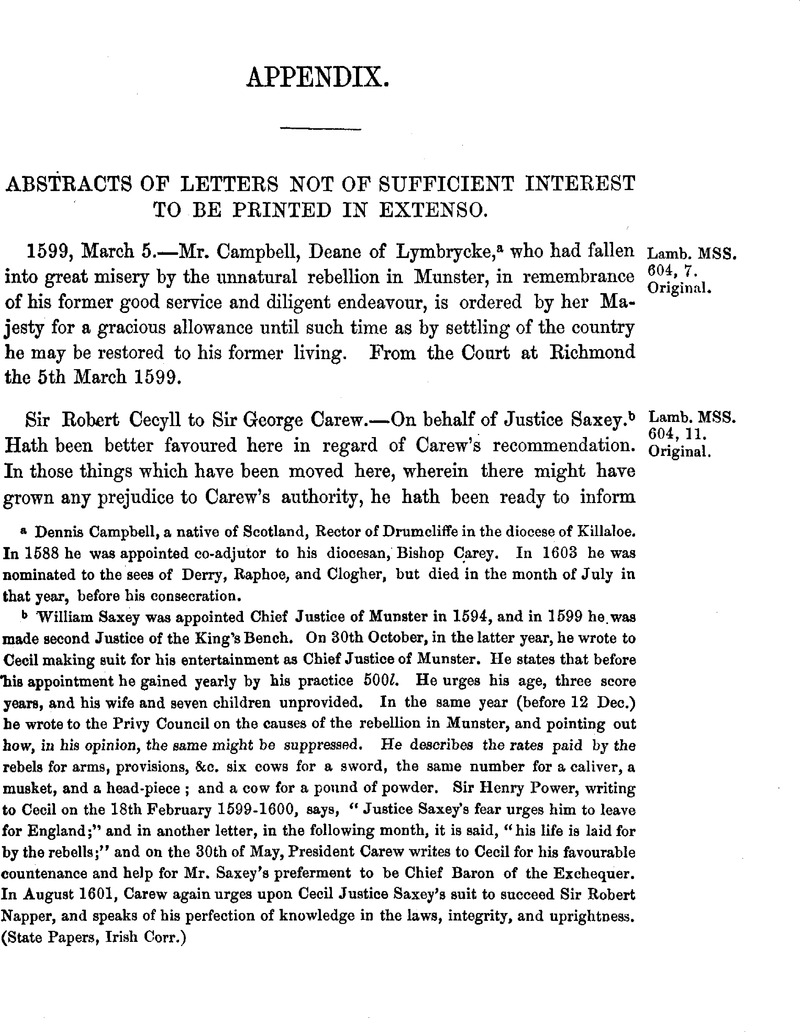No CrossRef data available.
Article contents
Appendix
Published online by Cambridge University Press: 23 February 2010
Abstract

- Type
- Appendix
- Information
- Camden Old Series , Volume 88: Letters from Sir Robert Cecil to Sir George Carew. , June 1864 , pp. 157 - 160
- Copyright
- Copyright © Royal Historical Society 1864
References
page 157 note a Dennis Campbell, a native of Scotland, Rector of Drumcliffe in the diocese of Killaloe. In 1588 he was appointed co-adjutor to his diocesan, Bishop Carey. In 1603 he was nominated to the sees of Derry, Raphoe, and Clogher, but died in the month of July in that year, before his consecration.
page 157 note b William Saxey was appointed Chief Justice of Munster in 1594, and in 1599 he. was made second Justice of the King's Bench. On 30th October, in the latter year, he wrote to Cecil making suit for his entertainment as Chief Justice of Munster. He states that before “his appointment he gained yearly by his practice 500l. He urges his age, three score years, and his wife and seven children unprovided. In the same year (before 12 Dec.) he wrote to the Privy Council on the causes of the rebellion in Munster, and pointing out how, in his opinion, the same might be suppressed. He describes the rates paid by the rebels for arms, provisions, &c. six cows for a sword, the same number for a caliver, a musket, and a head-piece; and a cow for a pound of powder. Sir Henry Power, writing to Cecil on the 18th February 1599–1600, says, “Justice Saxey's fear urges him to leave for England;” and in another letter, in the following month, it is said, “his life is laid for by the rebells;” and on the 30th of May, President Carew writes to Cecil for his favourable countenance and help for Mr. Saxey's preferment to be Chief Baron of the Kxchequer. In August 1601, Carew again urges upon Cecil Justice Saxey's suit to succeed Sir Robert Napper, and speaks of his perfection of knowledge in the laws, integrity, and uprightness. (State Papers, Irish Corr.)
page 158 note a See notee, p. 6, and noteb, p. 13.
page 158 note b Thomas Smythe, Commissary of Victuals at Galway, probably the son of Henry Smyth who wrote a report of the state of Munster, dated the 30th October 1598, which is inclosed in a letter from the Lords Justices and Council to the Privy Council, dated 3rd November 1598. (State Papers, Irish Corr.)
page 159 note a Captain Henry Clare. In October 1600, the Lord Deputy gave him Sir Robert LovelPs Company, in lieu of the other Company which Clare had at Loughfoil. In March 1601, he applied to Cecil for the office of Governor of Connaught. About the same time complaints were made against him by the Master (Mayor) of Galway, relative to the mischief and outrages he had committed. (State Papers, Irish Corr.)
page 159 note b Mr. Pyne, see noteb, p. 56.
page 160 note c Sir John Gilbert, of Greenway and Compton, co. Devon, uterine brother of Sir Walter Raleigh, had two brothers, the famous Sir Humphrey, who at this date was dead, and Adrian Gilbert, who at one time was engaged in some mining speculations in Devon. It is presumed that the latter was the person commended to Carew's good offices in this letter. His mother and Carew's were sisters, being daughters of Sir Philip Champernon.
page 160 note a See notea, p. 56.
page 161 note a Lodowick Bryskett is mentioned in the Irish State Papers as early as 1590. On 1 Sept. 1594, the Lord Chancellor of Ireland wrote to Lord Burghley for the stay of the letters procured in favour of Lodowick Bryskett to be Clerk of the Council, which office is already passed to William Uscher. He says, “Lodowick Bryskett's father was a natural Italian; he keeps a continual correspondence with Florence.” In 1595, Bryskett was appointed to the newly created office of Clerk of the Casualties. (State Papers, Irish Corr.)
page 161 note b See notec, p. 135.
page 161 note c Sir Gerard Harvey was the second son of John, son and heir of Gerard, illegitimate son and successor of Sir George Harvey, of Thurleigh, co. Beds. Sir Gerard was knighted at Cadiz, 1596; and was one of the Sergeant-Majors in Ireland in 1599.


